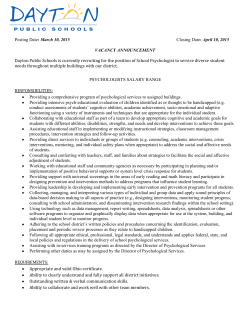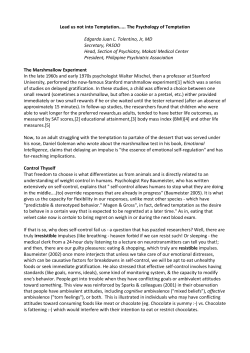
Round Table 1: Socio-Emotional Constructs and Development
Round Table 1: Socio-Emotional Constructs and Development Oliver P. John University of California Contributions from Psychology • 1. A comprehensive model of socio-emotional constructs: Five Flowers • 2. Development: How and when do these change? OECD: Three Issues in Schools • Achieving goals: – Learning how cells work, writing an essay • Working with others: Social – Interacting with teachers and peers • Managing feelings: Emotional – Anxious before a text, sad after a bad grade Top 3 Skills in Berkeley Schools Most Comprehensive List of 21st Century Skills (C. Fadel and Collaborators) Ability to quickly acquire and apply new knowledge Abnegation Abstract problem solving Acceptance Accountability Adaptability Altruism Applying technology Appreciation Appreciating beauty in the world Appreciating others Appreciating what I have Assertiveness Authenticity Balance Belonging Benevolence Bravery Camaraderie Care Charisma Charity Curiosity Grace Motivation Self-esteem Dealing with ambiguity Decency Decisiveness Decorum Delegation Dependability Determination Devotion Diligence Gratitude Grit Growth Happiness Helpfulness Heroism Honesty Honor Humaneness Negotiation Observation Oneness Open-mindedness Optimism Organization Passion Patience Perseverance Self-kindness Self-reflection Self-respect Selflessness Sensibility Sharing Social awareness Social intelligence Social perspective Humbleness / humility Humor Inclusiveness Initiative Innovation Inquisitiveness Insight Inspiration Integrity Interconnectedness Interdependency Justice Persistence Playfulness Precision Presence Problem solving Productivity Professionalism Project management Prudence Public speaking Receptivity Reliability Socialization Speaking out, taking a stand Spirituality Spontaneity Sportsmanship Spunk Stability Tackling tough problems Teamwork Tenacity Timeliness Tinkering / inventing Kindness Resilience Tolerance Citizenship Civic-mindedness Commitment Discipline Diversity Efficiency Effort Empathy Energy Engagement Enthusiasm Equanimity Equity Ethics Excitement of creating something new Executing plans, follow through Existentiality Exploration Fairness Resourcefulness Respect for others Responsibility Toughness Tranquility Trustworthiness Common humanity Compassion Confidence Conscientiousness Consciousness Consideration Consistency Cooperation Courage Critical thinking Cross-cultural awareness Feedback Feeling awe Flexibility Focus Followership Following Forgiveness Fortitude Generosity Genuineness Goal orientation Leadership Leading by example Learning from mistakes and failures Listening to others Living in harmony with nature Living in harmony with others Load management Love Loyalty Mental flexibility Mentorship Mercy Mindfulness Modesty Results orientation Reverence Risk taking Self-actualization Self-awareness Self-care Self-compassion Self-control at school Self-control in relationships Self-direction Self-discipline Truthfulness Verve Vigor Virtue Vision Willingness to try new ideas Wonder Work ethic Zeal Zest Cheerfulness The OECD Framework: FFM • • • • • Five Flowers Model (John & DeFruyt, 2015) Five broad domains of socio-emotional skills Not just 5 skills: Hierarchical model More specific skills in each flower Thousands more specific skills 2. Development • Two critical school transitions – Into school and middle childhood: Learning the “good student” identity: A, C, and ES up – Through adolescence: Learning the skills to form an adult identity and launch into adult world • General “typical” developmental trends – Versus individual trajectories Agreeableness early gain, then slow down Score 6 catching up average trajectory 5 4 5 6 Age (years) 7 Agreeableness and Conscientiousness 0.55 0.45 Agreeableness Mean 0.35 0.25 0.15 Conscientiousness 0.05 10 11 12 13 14 15 16 17 18 19 Age Note: Points are observed means. Trends are quadratic regression curves (Soto, John, Gosling, & Potter, 2011). 20 Limitations: So much we do not know • Most research cross-sectional – Different kids at different ages (hard to compare) • But we need longer-term longitudinal research – Study same kids over time: map individual trajectories • Much of the research conducted in – USA, Northern Europe – Now Brazil! • We’ve learned much about “subjective” measures of socio-emotional skills • But we have more work to do
© Copyright 2025













